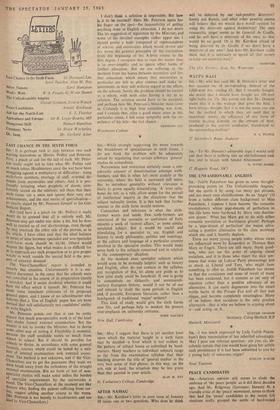SIR, — While strongly supporting the move towards the breakdown of specialisation
in sixth forms, I do not think the problem will be adequately solved by stipulating that certain arbitrary 'general' studies be compulsory.
Narrowness and restriction certainly cause a con- siderable amount of dissatisfaction amongst sixth- formers, and this is often felt more acutely at the university, where the field is narrowed still more. But to introduce generality without relevance is likely to prove equally dissatisfying. 'A' level sylla- buses do not, as a rule, allow scope for the pursuit of intellectual inquiry in the directions that the subject naturally invites. It is this lack that further courses in the sixth form should remove.
Connection and relevance is what the sixth- former wants and needs. Few sixth-formers are convinced of the necessity or usefulness of forty minutes a week of 'current affairs,' or some similar unrelated subject. But it would be useful and stimulating for a specialist in, say, English and history to study philosophy, politics and sociology, or the culture and language of a particular country involved in the specialist studies. This would make sense both to the subjects concerned and in relation to the contemporary situation.
At the moment even specialist subjects which would seem to be mutually helpful, such as history and English, often do not contain in the syllabus any recognition of this, let alone any guide as to how joint study could be beneficial. If one is going to concentrate on sixteenth- and seventeenth- century European history, would it not be of use and interest to study the same periods in English and, if possible, European literature, rather than a hotchpotch of traditional 'major' writers?
This kind of study would give the sixth forms new life, and perhaps help to weaken the present over-emphasis on university entrance.
JENNI DAICHES
New Hall. Cambridge


































 Previous page
Previous page